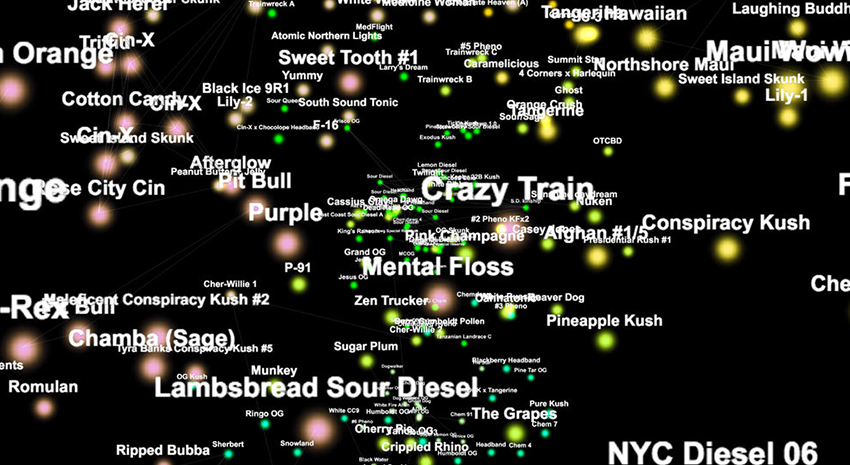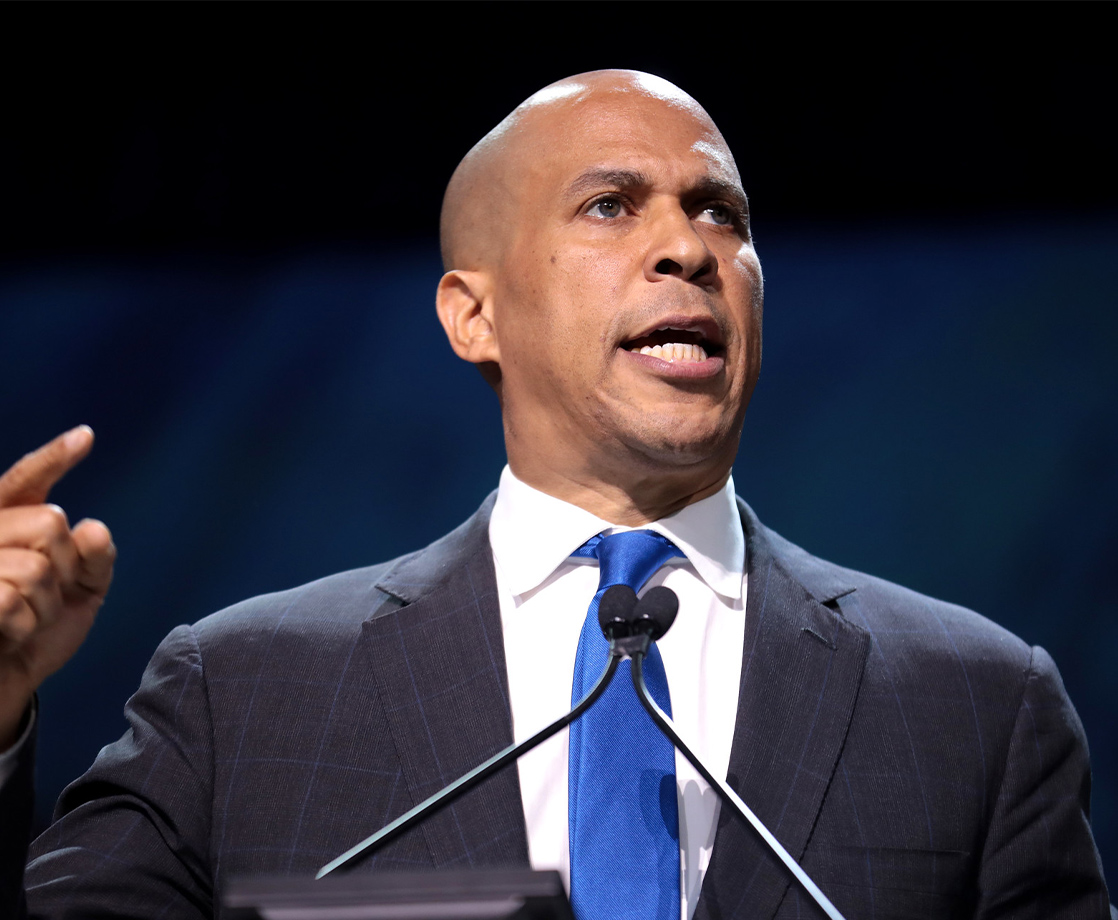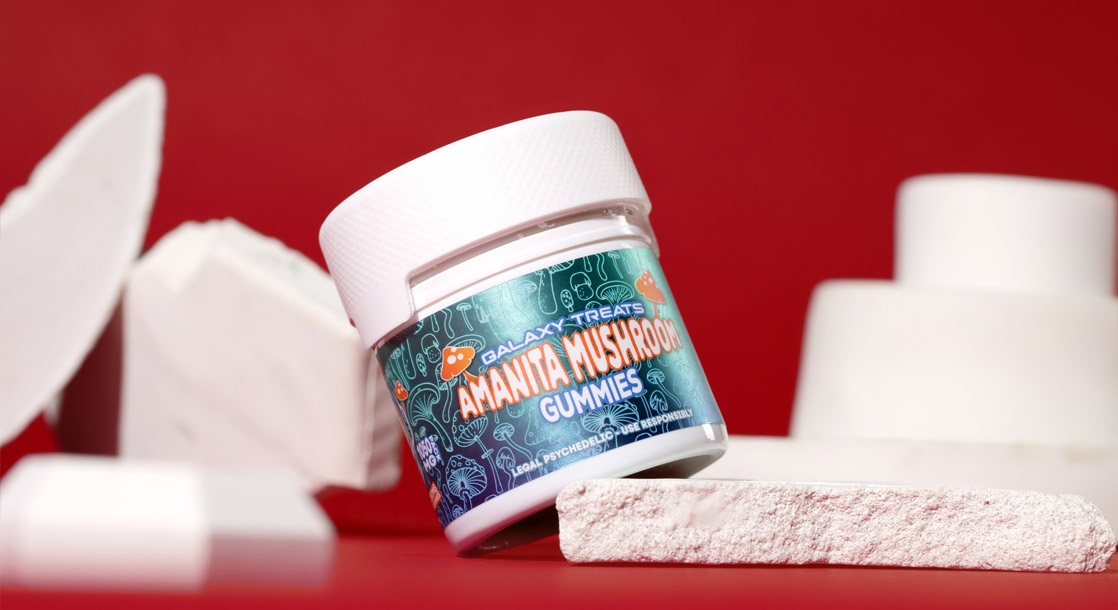Did you know cannabis is one of the least-studied plants in the world? That’s because decades of prohibition have thrown so much shade its way. Mowgli Holmes is cofounder and Chief Science Officer of Phylos Bioscience, a cannabis genomics firm on a mission to unravel the evolutionary story of cannabis, create viable industries, and protect cannabis plant diversity. Armed with a bank of cannabis genetic data, Phylos may help cultivators harvest cannabis using modern agricultural and technological methods. Using DNA sequence data to map the relationships between thousands of cannabis varieties, Holmes and his team are creating a living 3D visualization of this new cannabis world called the Phylos Galaxy. Think ancestry DNA, but for your Grand Daddy Purps. MERRY JANE caught up with Holmes to discuss how modern molecular genetics and computational biology can advance craft cannabis and shed light on one of the most censored plants of all time.
MERRY JANE: Why are you doing this cannabis genetics work and how can we benefit from it?
Mowgli Holmes, PhD: Cannabis is about to be the third largest agricultural crop in the country, yet it’s in the dark ages in terms of agricultural science. Modern crops have had a century of scientific breeding to optimize them for traits like pest-resistance, drought-tolerance, chemical composition, and so on. Cannabis hasn’t been optimized for anything but THC concentration and yield. And, some nice smells and flavors. Worse, there are no true breeding lines, which makes it impossible to grow commercially from seed.
We’re bringing all that science, and we’re going to make incredible new cannabis plants. Without using GMOs. Just through traditional breeding guided by data.
And, we’re using the same genomics to clear up the mess around identifying, naming, purchasing and licensing different varieties. The Phylos Genotype test is like 23AndMe for cannabis; it lets people claim their spot in the Phylos Galaxy and find out, for the first time, what they’re really smoking.
Geneticist Mowgli Holmes in the lab.
Your background is impressive, and so is your team. I noticed cannabis researcher Robert C. Clarke is on your advisory board and read about your work with Robert DeSalle, biologist at the American Museum of Natural History in New York, among other notable researchers. What is the Phylos process and how is the advisory board/Phylos team involved?
All those folks have different roles, but they’re all pretty involved. Rob DeSalle was a professor of mine at Columbia, and the coolest guy in the world. He’s obsessed with understanding how domestication changes the patterns of evolution. They were early funders of our sequencing and have really helped us put the Galaxy together. Hopefully, we’ll publish all our evolutionary history results with them sometime next year. Rob Clarke is a good friend and really the grand elder of cannabis plant science. He was key in helping us get connected to the whole network of old-time collectors and breeders, and put together the library that powers the Galaxy.
What are your thoughts on the “traditional” Indica/Sativa classification?
It’s meaningless. It’s still helpful just because people need a shorthand to tell them if something is stimulating or relaxing. But, if there were ever really two categories or subspecies, they’re gone now. All those traits are mixed together in the big poly-hybrid mess. Maybe broad leaves, short stature, and sedation used to go together. Now, those traits are all bouncing around on their own in the population.
Is it really possible to determine lineage with all the previous misinformation, mislabelling of seeds, clones, cultivars, etc.? Where is the wild, ancestral cannabis? Does it exist anymore?
Well, that’s why we’re relying on genetics instead of word of mouth. Of course, the biggest confirmation of a story or a sample identity is when the legend and lore match up perfectly with the genetics. But, the genetics on their own will tell us. We just need to grow the database large enough. Right now, it’s still hard to figure out some of the answers.
The old ancestral cannabis? Probably gone. Along with most of the stuff from the ’70s.
Everyone loves to talk about the “Founding Fathers” cultivating hemp and its use in paper, money, and its early uses in the pharmacopoeia to support claims against cannabis criminalization in the United States (and elsewhere). Is there newer, more robust information about the history of cannabis cultivation and use in the U.S.?
Not yet. But, one of the most interesting questions we have revolves around all the old pharmacy samples we have from the 1930s. If we can obtain genetic material from them, we should be able to tell a real story about what people were growing and where it came from.
How are your efforts shaping policy? How can more people get involved in pushing legalization efforts forward across the industry landscape?
We’ve spent a ton of time in Oregon state politics. We helped to write laws creating good testing regulations, though obviously that fell apart once the OHA got its hands on it. We’ve helped with laws protecting small growers, helping them get their products to shelves. And, we have a bill in session right now that would create a freestanding cannabis research institute. We haven’t worked much on federal policy. We’re more focused on the debate about what we want the future of the industry to look like. We want a cannabis industry that’s a craft, artisanal, Oregon-style economy, one that protects economic diversity and plant diversity. As you know, that’s kind of an uphill battle.
The best way to help the national legalization effort, if you ask me, is to donate money to Ethan Nadelman and the DPA.
The patenting of strains is a hot topic these days. What is Phylos’ involvement in the Open Cannabis Project and how can it help growers and cannabis businesses?
We’re donating all of our raw sequence data to the Open Cannabis Project (OCP). The idea is: If we make a library of evidence of “prior art,” it will be harder for people to patent existing stuff that should really be considered public domain. We’re also trying to help the OCP fight against the big broad plant utility patents that have already been granted for cannabis. They’re terrible; they just favor big industry and they’re going to kill plant diversity.
You’ve said previously that down the road your efforts can “help breeders make absolutely crazy, wild weed,” cannabis that would be “unthinkable” today. What’s an example of that?
OK, here’s an example: High-yielding, hard-to-kill plants that are totally resistant to powdery mildew, smell like oranges and chocolate, have nice spikes of rare anti-inflammatory cannabinoids and only have 6 percent THC, so you can smoke them with your mom all day long.
That sounds tremendous, especially knowing it’s through traditional breeding without GMOs. How can breeders and growers work with Phylos?
Right now, we’re selling the Phylos Plant Sex Test and the Phylos Genotype test. Both of those are turning out to be hugely valuable to both growers and breeders. In the future, we’ll be setting up collaborations with breeders to work on new plant varieties and developing new sets of genetic tests that help breeders accelerate their process.
What’s next for your firm?
We’re the anchor tenant for the Oregon HUB, a cannabis research campus being built 20 miles south of Portland. We’ll be right next to Jeremy Plumb’s Newcleus Nurseries, and the dream is that it turns into a laboratory focused on figuring out how the Oregon cannabis industry can be the most science-driven, environmentally sustainable, and craft-focused in the country.
For more information on Phylos Bioscience, visit the firm’s website, Twitter, Facebook, and Instagram.











